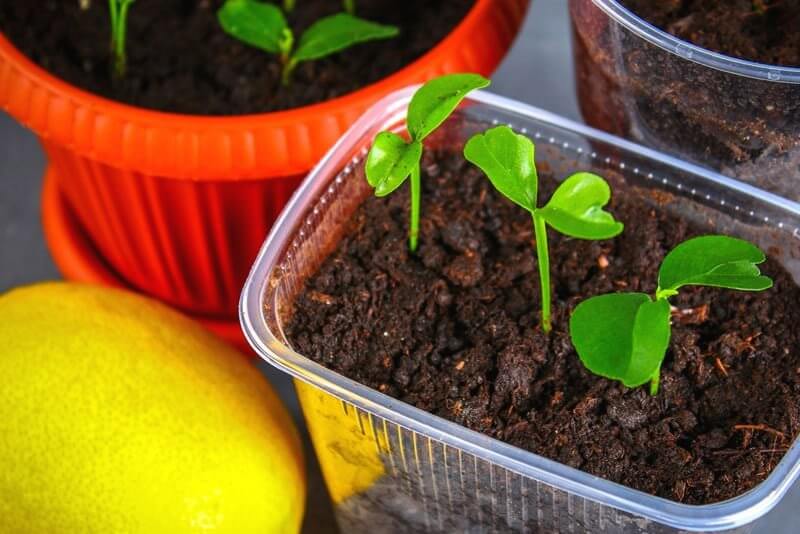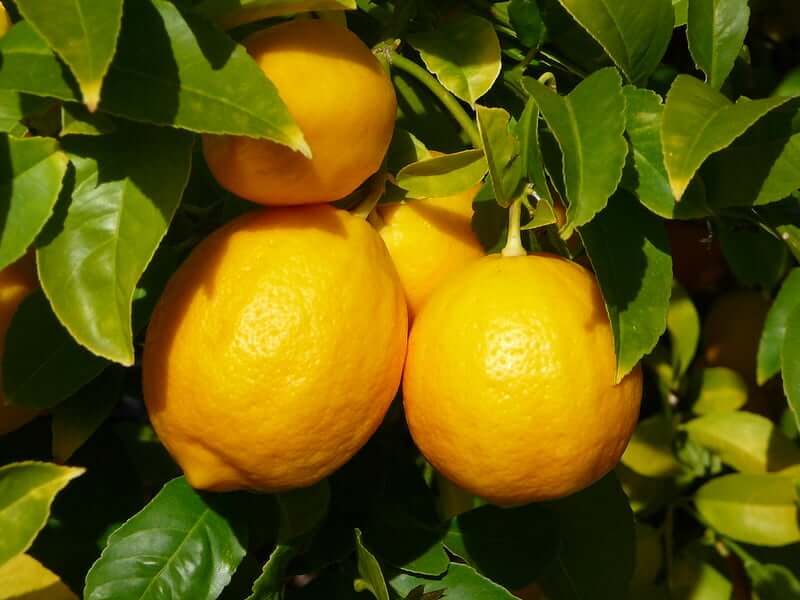If you’re looking to add a tree to the smallest of your garden space, a lemon tree might come on top of your list. From the small size of the tree to its abundant fruits, there are many fascinating things about growing a lemon tree in your yard.
It takes 3 to 6 years to nurture a lemon-producing tree from its seed. The actual duration will depend on the species of lemon and the environmental conditions.
Growing lemons to their peak height might take up to 25 years while it only takes a few months to get a small lemon tree sitting pretty in a pot in your home.

What we cover
ToggleWill dry lemon seeds germinate?
No. Dry lemon seeds will not germinate. If you’re planting a lemon tree from its seed, you should do so while the seed is still wet. That would be right after harvesting the seed from the fruit. If you’re not able to do so immediately, put the seeds in a glass filled with water for planting the following day.
Lemon tree growth rate
Each species of lemon tree has a different rate of growth. Even though there are many varieties you can choose from, you can decide to go for the one that best suits your timetable with its growth.
The average growth rate of lemon trees is 6 to 12 inches per year. They can grow as high as 20 feet tall at full maturity.
| Age of lemon tree | Expected fruit production rate |
|---|---|
| 1 - 2 years | None |
| 3 years | 20 to 40 pounds |
| 4 - 5 years | 100 pounds or more |
| 10 years | 300 pounds |
With the right growth conditions, the lemon tree will be able to reach its full growth potential every season.
Lemon trees thrive well in well-drained soil under full sun. If your lemon tree is planted in a spot with heavy sun and proper drainage, it will likely grow about 6 to 12 inches each season.
Which species of lemon tree should you plant?
Eureka lemon trees
Eureka lemons are a common type of lemon which are very easy to grow. They produce oblong juicy fruit with medium-gold color and thick skin. Eureka lemons can have yellow-and-green colored skins and flesh with a distinctly pinkish hue.
Meyer lemon trees
Meyer lemons are a very sweet variety of lemons. Their trees produce fruit all year round but do not do well under cold weather. They can be grown in containers and this makes it easy to bring them inside during the winter season.

Meyer Lemons | alasam | Flickr | CC BY-SA 2.0
Verna lemon trees
This species of lemon tree can stay outside all year round. It is well known for its exceptional spread and produces fruit three times in a year. It has a maximum maturity height of about 12 feet. Verna lemon fruit has a juicy pulp and very thick skin.
Primofiori lemon trees
The Primofiori lemon tree is a native fruit of Spain and produces fruit all year round.
It does well in a raised garden bed or a container for easy transport during the winter. It has a very juicy pulp and highly acidic juice which makes it unfit for raw eating but perfect for cooking and baking.
It is a perfect fruit for your home garden especially if you live in a tropical region.
Avalon lemons
Avalon lemons are also known as Avon lemons. They are large yellow fruits with a bumpy rind and are major constituents of lemon juice concentrates. They are perfect for juicing because of their large size, high liquid content, and mild sweet-tart flavor. Avalon lemons are widespread throughout Florida and have many similar traits to Eureka lemons. Avalon lemons thrive better in indoor planters because they prefer a very warm humid climate.
Do lemon trees need to be pollinated?
After picking your most preferred species of lemon, you may be wondering whether your lemon tree will need to be cross-pollinated. Just like most citrus trees, lemon trees are self-pollinators and they do not need to be pollinated by an external source before producing fruits. Whether you have other lemon trees close to you or not, it doesn’t affect the fruit production of your lemon tree.
Having other lemon or citrus trees around will however increase the fruit production of your tree without changing the timeline.
Should I grow my lemon tree in the ground or in a container?
If you live in a place with warm temperatures all year round without the risk of frost, it’s best to plant your lemon trees in the ground. Watching it blossom in one corner of your yard is a good thing.
On the other hand, if you live in a cold place where frosts are inevitable, making it stay in the ground will expose it to harsh weather and slow down its growth rate. In this case, you should plant your lemon tree in an indoor pot and keep it warm and happy.
What are the best lemon trees for indoor planting?
If you’re looking for a lemon tree that is fit to be grown indoors, you need those species of lemons that stay small forever with a fast fruit production timeline. The most popular indoor lemons are usually crossed with other fruits and you can also find dwarf lemons that do well in pots.
If you’re getting a dwarf lemon tree from a nursery, you’ll likely be getting one around two to three years old. Most of such trees are not yet matured while others are old enough to start bearing fruit. Most indoor lemon varieties are between 3 to 6 feet tall at full maturity, even when planted on the ground, provided the fruit tree is pruned regularly.
It’s important to keep in mind that growing a lemon tree from its seed is entirely different from growing from a cutting or getting one from a nursery. The size of the tree, disease resistance, and fruit production will not be the same as the already grafted dwarf trees.
Here are the best varieties of dwarf indoor lemons to consider:
Dwarf improved Meyer
This is the easiest indoor lemon tree. It was originally produced by crossing lemon and mandarin orange to produce sweet tangy lemons.
Dwarf Ponderosa
The dwarf ponderosa is another popular indoor choice for your lemon tree. It is produced by crossing lemon and citron and ends up bearing large lemony fruit.
Dwarf Variegated Pink Lemonade
This is a green-and-yellow variegated fruit of a true lemon tree that produces fruit with pink flesh and clear juice.
How long does it take a dwarf lemon tree to produce fruit?
It takes up to three years for a typical dwarf lemon tree to start producing fruits.
How often do lemon trees produce fruit?
The rate of fruit production in lemon trees depends on the variety of lemons. The peak of production for most lemon varieties is in the winter months. Meanwhile, depending on the species and environmental conditions, you can possibly harvest lemons throughout the year. The primary harvest season for Eureka lemons is from late winter to early summer, however, it can still be harvested all year round.
Meyer lemons are mainly picked from November to March but they are likely to have some ripe fruit almost any time of year.






